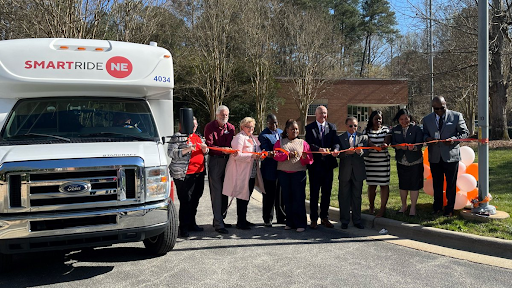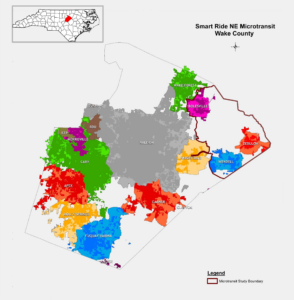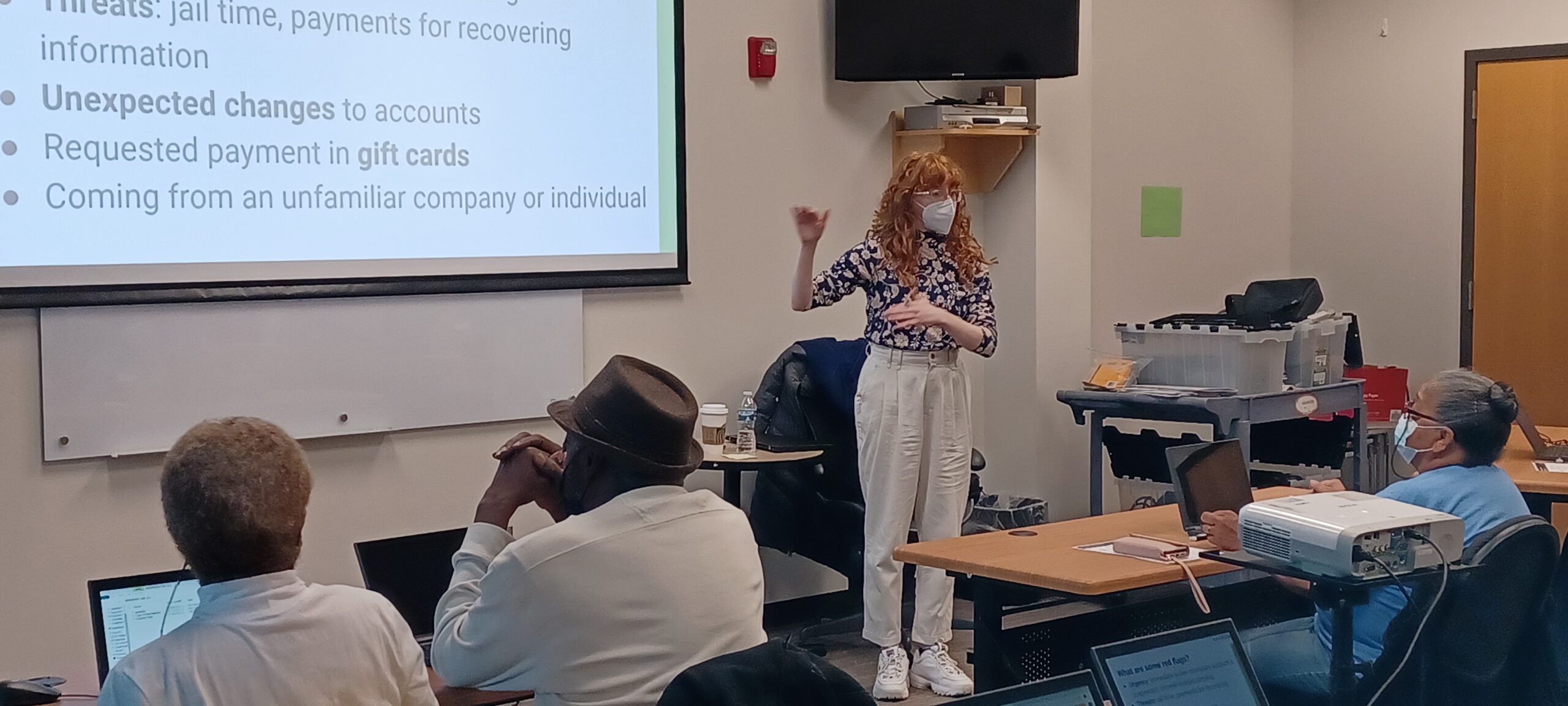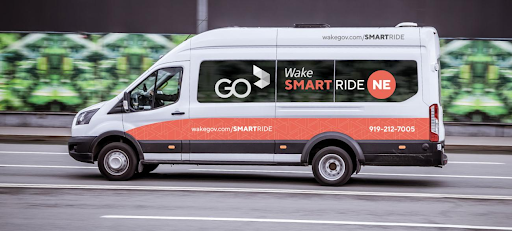Bridging the First and Last 5 Mile Gap: Microtransit in Northeast Wake County, NC
20 minutes Author: Shared-Use Mobility Center Date Launched/Enacted: Nov 29, 2022 Date Published: December 5, 2022

Brief Summary
- The Wake County Department of Health and Human Services received an Integrated Mobility Innovation (IMI) grant from the Federal Transit Administration (FTA) in 2020 to develop a microtransit pilot, named GoWake SmartRide NE, in northeast Wake County, North Carolina.
- GoWake SmartRide NE’s service area covers a largely rural part of Wake County, centered around the towns of Rolesville, Zebulon, and Wendell, areas that have historically been underserved by public transit.
- For Phase 1 of the pilot, GoWake Access Transportation contracted with KFH Group to conduct a feasibility study to help plan and see how a new microtransit service could impact the area and its residents.
- GoWake SmartRide NE officially launched in Summer 2021, and has completed over 5,000 rides as of November 2022.
- GoWake Access Transportation partnered with Kramden Institute to host educational programs to help adults with lower technological literacy learn how to book rides and get accustomed to the new mobile app.
- As the demonstration portion of the pilot comes to an end in Spring 2023, GoWake Access Transportation is looking towards how to extend and grow the service.
Description: Video interview with Anita Davis-Haywood from the Wake County Department of Health and Human Services.
Credit: Shared-Use Mobility Center (SUMC)

This pilot project is part of the Mobility Innovation Collaborative (MIC) program, a partnership between the Shared-Use Mobility Center and the Federal Transit Administration. The MIC program provides a comprehensive suite of technical assistance resources, promotes knowledge sharing activities, and captures stories and lessons learned from nearly 50 innovative mobility projects across the United States.
Introduction
In recent years, agencies throughout the country have developed microtransit pilots as solutions to improve and expand transportation access, especially to areas with unreliable or nonexistent fixed-route service. As a flexible, on-demand mode, microtransit helps riders directly reach destinations with previously limited or difficult access through other public transit services, and allows for efficient and convenient transportation in areas where few or no options existed previously.
Looking for a way to improve transportation access to some of the county’s most underserved areas, expand on its existing paratransit service, and integrate with other transportation services in the region, GoWake Access Transportation, a part of the Wake County Department of Health and Human Services that provides some transportation services to the region, decided to develop GoWake SmartRide NE, a microtransit pilot project in northeast Wake County, North Carolina. The pilot focuses on solving the first/last 5 mile problem – an expansion of a longstanding first/last mile framework that caters more closely to the area’s rural population and allows for access to more destinations and more connections with other transportation services.
History of the Program
Wake County is home to various public transit services, including GoRaleigh, serving the city of Raleigh, GoTriangle, serving the “Research Triangle Region” in Durham, Raleigh, and Chapel Hill, and GoCary, serving the city of Cary and providing contract fixed-route services to the city of Apex and microtransit service for the city of Morrisville.
Run by GoWake Access Transportation as part of the Wake County Department of Health and Human Services, GoWake Access is the county’s paratransit service, providing door-to-door, shared transportation. In 2020, the Wake County Department of Health and Human Services applied for the Federal Transit Administration (FTA) Integrated Mobility Innovation (IMI) grant to fund a microtransit project under GoWake Access Transportation which would become GoWake SmartRide NE, and ultimately received $393,527 through the program.
The GoWake SmartRide NE pilot project was separated into two phases. Phase 1, carried out between June 2020 and May 2021, consisted of a feasibility study to examine how a new microtransit service could impact the area and its residents. GoWake Access Transportation contracted with KFH Group, a transportation consulting firm, to assess the service area and project plans. KFH Group performed several tasks for this assessment, including reviewing existing county transit services, developing a five-year financial plan, creating key performance measures, and engaging with key community stakeholders through discussions, focus groups and surveys. The outcome of this assessment was an in-depth service plan outlining implementation steps, strategies, and considerations that GoWake Access Transportation could use when fully launching the pilot.
Once the initial feasibility study was completed in early 2021, Phase 2 of the pilot implementation began with marketing and educational campaigns, including adult-oriented technology classes to help riders get used to the new platform. GoWake SmartRide NE officially launched its service to the public in March 2021, and the pilot period supported by the IMI grant is scheduled to run until Spring 2023, at which point GoWake Access Transportation will evaluate how to expand the service and decide next steps. Between when the pilot launched in March 2021 and October 2022, GoWake SmartRide NE has completed over 5,000 trips.
Program Goals
The main goal for the GoWake SmartRide NE pilot project was to improve transportation access for people living in some of the most underserved areas of the county without sufficient access to fixed-route transportation. Residents of northeast Wake County began using and appreciating the service as soon as it was available. To measure the success of the project, GoWake Access Transportation is collecting data on several key performance indicators, including ridership, number of completed and canceled trips, and trip duration, among other indicators. Ultimately, GoWake Access Transportation hopes for a high ratio of completed to canceled trips, low rider duration on vehicles, and increasing ridership while keeping on-time performance.
Program Operations
The pilot project focuses on a 100 square mile zone in the northeast portion of the county, centering around the towns of Zebulon, Wendell, and Rolesville, as well as the surrounding unincorporated areas. While there are over 1 million people in Wake County, the population in GoWake SmartRide NE’s service area is a largely rural part of the county with a population of about 43,000 – 17,000 of which live in unincorporated areas. The microtransit service runs curb-to-curb service Monday through Friday from 6:00 am to 7:00 pm.

Service area of GoWake SmartRide NE within Wake County, and location of Wake County within North Carolina
GoWake SmartRide NE uses three wheelchair accessible Ford Transit cutaway vans. GoWake Access Transportation procured these vehicles and contracted vehicle operators through an existing vendor contract with MV Transportation, a passenger transportation contracting firm. Since MV Transportation provides services for other county transportation programs, leveraging the relationship made for an easy and straightforward contracting process to include the new microtransit service, and allowed GoWake Access Transportation to avoid having to issue an additional request for proposals.
GoWake Access Transportation needed to procure a technology partner to manage booking and dispatching for the microtransit service. GoWake Access Transportation had previously been using Routematch as a technology partner for some of its other transportation services. In mid-2020 Uber acquired Routematch, and GoWake Access Transportation decided to continue using the technology, which would now operate as an integrated service within Uber’s platform, rather than issuing a new request for proposals (RFP). This platform allows for dynamic routing and scheduling. When multiple users request rides heading in a similar direction, Routematch will pair the riders with a GoWake SmartRide NE vehicle, and direct the riders and driver to a virtual stop, a dynamic location generated by the app that is convenient and safe for pick-ups and drop-offs. Users book rides through the Uber app. When the Uber app is accessed within the geofenced service area, the app lists an option for GoWake SmartRide NE alongside other standard rides. To assist call-in riders and riders without a smartphone or Uber account, GoWake Access Transportation operations staff use UberCENTRAL, a dashboard that enables staff from organizations partnering with Uber to request, pay for, and manage multiple rides on behalf of customers.
GoWake Access Transportation held multiple meetings with the operations team prior to launching to ensure that operators were trained in interacting with UberCENTRAL. These meetings included videos, slideshow presentations, and dispatch and driver training sessions. Vehicle operators and operations staff have engaged in consistent communication since the launch through weekly troubleshooting meetings. Vehicle operators bring valuable insight from the field, which may not necessarily be reflected in call center or management records. These weekly meetings allow the entire team to discuss feedback, address problems, and collaborate on solutions together.
The GoWake SmartRide NE service is zero-fare for the entire pilot term. Initially, the plan was to charge $2 per trip, but to match with GoRaleigh, GoTriangle, GoDurham, and other state transportation services, which have suspended fares on March 2020 due to the COVID-19 pandemic, it was ultimately decided to keep GoWake SmartRide NE zero-fare as well. The Wake County Board of Commissioners voted unanimously to continue providing zero-fare rides through the end of 2022. Operations staff and county officials want GoWake SmartRide NE to stay in line with other regional systems, and will reevaluate its fare policy as those larger systems make decisions on whether to continue their own zero-fare services.
Community Outreach
Recognizing that this service would bring new features and technology unfamiliar to some of its target users, the Wake County Department of Health and Human Services developed adult education programs to help participants with basic computer and mobile app training. The county partnered with Kramden Institute, a local organization that provides technology tools and training to communities across the state to develop the courses, and the Eastern Regional Center, which had connections with various elderly communities, to recruit participants. The program consisted of four weeks of basic training, where participants were taught how to access the mobile app, create an account, book rides, and use other app features. For participants who did not own their own smartphone, model phones were provided to test out the app. As an added benefit, those who completed the full training were given new laptops provided by Lenovo and the Kramden Institute. Though there is no data available on how the program influenced GoWake SmartRide NE ridership among participants, the training was very popular, and several senior centers have reached out to ask for additional classes. The county intends to continue and expand this program in the future.

An adult education program to help senior participants with basic computer and mobile app training
Credit: Wake County
Accessibility
Facilitating adult education classes was a big step in making the service accessible to many potential users. Many Wake County community members targeted by this program were unfamiliar with using a mobile app or computer; the training sessions were helpful in addressing those needs. For users without smartphones, or users with less technological literacy who were not able to participate in the classes, GoWake Access Transportation operates a call center as another option to book rides.
All three GoWake SmartRide vehicles are wheelchair accessible. Though the service is regularly curb-to-curb using virtual stops, the service is designed to accommodate passengers with ambulatory challenges. When notified, drivers can provide door-to-door service and can assist passengers with boarding or alighting.
Challenges and Lessons Learned
As with many recent mobility projects, GoWake SmartRide NE faced challenges due to launching during the COVID-19 pandemic. These included staffing shortages, which were felt throughout the county in various departments, and the additional efforts to ensure that vehicles were safe and sanitized. Despite the restrictions, users responded positively to the service once it launched and many became regular riders. The initial positive feedback from the public increased demand for the service, which also put pressure on GoWake Access Transportation. A large service area coupled with staffing shortages and only three vehicles posed operational difficulties, especially as demand for the service steadily increased. As GoWake Access Transportation considers expanding the GoWake SmartRide NE project, creating smaller zones may help serve communities more efficiently.
GoWake Access Transportation has also faced some issues with its partnership with Uber, particularly related to data collection, ownership, and reporting. Uber’s internal data policies do not always align with the agency’s needs, a disconnect which has caused some challenges for GoWake Access Transportation in serving its residents. Uber, like many other private transportation companies, considers rider data private and proprietary and is unwilling to share it. Therefore, if a customer requests a ride through the GoWake SmartRide NE mobile app, GoWake Access Transportation does not have access to that customer’s information, cannot get feedback from that individual about the service, and cannot relay important information about service changes or emergencies directly to riders. GoWake Access Transportation is currently working with Uber on transitioning to a managed care platform versus the current general platform, which will hopefully help the operations team better access some of that rider information.
A final lesson learned from the GoWake SmartRide NE pilot is to wait to expand service or make any other major changes to the project until fully collecting and analyzing data. Rushing expansion efforts can end up changing the outcome of the project before the project team can fully understand how the service operates. Consistent communication with everyone involved, including targeted users, technology partners, and operations team members is also key to understanding the project’s operations. GoWake Access Transportation was able to avoid much of this by performing the in-depth feasibility study prior to launching.
Future Plans
The future of GoWake SmartRide NE can be summed up in one word: growth. The implementation of the pilot project supported by the IMI grant ends in Spring 2023, but GoWake Access Transportation plans to not only continue the service, but expand and improve it. This expansion may include extending the operating hours, providing service on the weekends, or growing the service area to serve more communities. As the pilot nears its scheduled end, specifics of GoWake SmartRide NE’s growth plans will emerge. Additionally, other areas in North Carolina are exploring microtransit as a transportation option, and as a pioneer of microtransit in the region, GoWake SmartRide NE can be a valuable resource for those communities.

A GoWake SmartRide NE van
Credit: Wake County
Conclusion
Microtransit has great potential to address the mobility needs of traditionally underserved communities. GoWake Access Transportation realized parts of its service area were lacking suitable transit options, and developed GoWake SmartRide NE as a solution to those challenges. Through an extensive preliminary feasibility study, adult education programs, and efforts to integrate with other area transit services, Wake County made GoWake SmartRide NE an accessible, connected, and community-focused microtransit pilot.
Key Considerations for Implementing a Microtransit Service
- What is your service area(s)? What resources (staff, vehicles, facilities) will you need to sufficiently serve the selected service area(s)?
- What other mobility services exist in your area? How do you plan to connect, coordinate, or integrate this service with others?
- Are you able to support your project with your agency’s existing vehicles, or will you procure new vehicles?
- What are the technology needs of your agency for your project? What will you need from a technology partner? How can you ensure that your technology partner will align with your agency’s goals as closely as possible?
- What staffing needs do you anticipate? Do you need to hire new staff to support the new service? How do you plan to hire and retain operators?
- Who is your target audience? What tools and knowledge will they need to use your service?
- How do you plan to teach users who are not technologically savvy how to use your service? If you decide to do any kind of educational programming, what partnerships and resources (staffing, funding, time) will you need?
- How do you plan to accommodate access to the service for users without smartphones, reliable data plans, or computers?
- Are you planning on expanding the service in the future? If so, how will you ensure that it will be scalable?